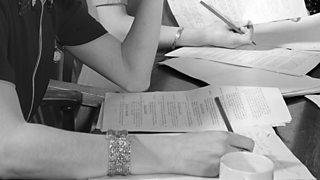Poetry by Heart Anthology 2020
Learning by Heart
When was the last time you learnt something by heart? Stopping speeds for your driving test? The periodic table for chemistry A-level? Poetry Please discusses the art of improving your memory.
When was the last time you learnt something by heart? Stopping speeds for your driving test? The periodic table for chemistry A-level?

Between around 1875 and the 1950s, ask any English British school child to quote you some poetry and you'd probably get a rapid burst, delivered correctly but without much emotion. All children were expected to learn many things by rote, including poetry.
The Ancient Greeks felt that learning poetry improved the mind, and Athenian schoolboys learned Homer. By the 1940s learning by rote was no longer fashionable, but it's now being reconsidered, and not just for schoolchildren.
So why, and how, should you do it? Significant cognitive benefits can be gained from learning by rote. It can improve information retention at any age, improve neuroplasticity in the elderly and stave off typical cognitive decline by seven to fourteen years. Learning by heart benefits the hippocampal foundation, the 'memory' area of the brain. It can also give you insight into the piece you're learning – a rhyme you hadn't seen, a phrase that resonates with you.
So how do you do it? Well, you've got a couple of choices.
Stage actors learn by rote, the old Victorian way. A couple of lines at a time, linked to cues, over and over again until they're lodged in the brain. Once you've got the lines down, you're 'off the book'.
TV actors, particularly in soaps, tend to have excellent short term memories – they remember the lines they need for the scenes they're shooting that day, but the day after, the lines have gone.
The Romans favoured the 'journey method'. You've probably seen this method used before for memorising a shopping list or a collection of unassociated items.
Create a journey through the poem, emphasise certain way-markers by exaggerating that particular word and its associated image, then take a walk through the poem, from way-marker to way-marker.
Don't expect too much of yourself; take two lines at a time, and learn just those two per day. If you try and move on too quickly you'll find you forget the first lines you learned.
Some people, particularly those with visual memories, find taking a walk as they learn helpful, and certain lines can be recalled by bringing to mind where they were when they learned them.
Practice everywhere you can – walking the dog, hanging out the washing, going on a run, and declaim the poem out loud, so that you are listening to the words as well as saying them.
If you're performing it in public, try and this is easier said than done, not to panic that you'll forget it. Anyone who's performed on stage has probably experienced that moment of blind terror in the wings when your first line disappears. Don't let the panic that you've forgotten the second line interrupt your delivery of the first.
One of the best things about learning poetry by rote is that you get to learn not just by heart, but with heart. The poem becomes a part of you. It's a link back to the person you were when you learned it, and you carry it with you wherever you go. And you can't really say that about stopping speeds...
Poetry by Heart Anthology 2020
Source: https://www.bbc.co.uk/programmes/articles/5vBSkrtKGkPJCj86Nh1hC4w/learning-by-heart